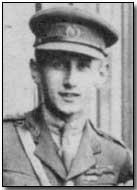Who's Who - Philip Fullard
 Philip Fletcher Fullard
(1897-1984) scored 40 victories (plus a further six probables) as a leading
British air ace
of the First World War.
Philip Fletcher Fullard
(1897-1984) scored 40 victories (plus a further six probables) as a leading
British air ace
of the First World War.
Born on 26 July 1897 and educated at King Edward VI school in Norwich, Fullard developed an active enthusiasm for sport while at school, captaining both the hockey and football teams. He was subsequently a reserve player for Norwich City Football Club.
Fuller enlisted in the British Army in 1915, initially with the Royal Irish Fusiliers. As with many other ultimately successful airmen Fullard sought and received a transfer to the Royal Flying Corps (RFC) the following year, receiving training at the School of Aeronautics at Oxford and then at Netheravon and Upavon. He received his pilot's certificate in December 1916.
Initially serving with the RFC in the capacity of flight instructor at Upavon Fullard finally gained his desire to see active combat with a posting to 1 Squadron on the Western Front in April 1917, the month of the highly successful Allied attack at Vimy Ridge.
Fullard lost no time in amassing a highly impressive aerial victory tally: all 40 of his successes were achieved between May and November 1917; he was inevitably 1 Squadron's highest-scoring ace of the war and flew Nieuport aircraft to great effect.
In September 1917 Fullard damaged blood vessels in an eye while out flying; the resulting temporary blindness kept him away from the fray for much of the next month.
Shortly before the opening of the British attack at Cambrai in mid-November 1917 Fullard suffered misfortune, breaking a leg while playing football with another unit. This rendered Fullard unfit for active duty for some ten months by which time the war was drawing to a clearly successful close for the Allies.
Fullard elected to remain with the Royal Air Force following the armistice, eventually reaching Air Commodore rank and serving once again during the Second World War (including a period as Duty Air Commodore at HQ Fighter Command); he eventually retired on 20 November 1946 at the age of 49.
Fullard, who won both the Distinguished Service Order and the Military Cross (with Bar) in 1917 and was in later years awarded the CBE, died on 24 April 1984 at the age of 86.
3 British Officers were executed by courts martial during the war, as opposed to 316 Private soldiers and 24 Non-Commissioned Officers. The vast majority were for desertions.
- Did you know?
